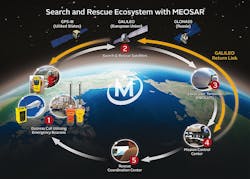NOAA chooses TSi for satellite terminal for global search-and-rescue system for planes and ships in distress
LANHAM, Md. – Search-and-rescue experts at the U.S. National Oceanic and Atmospheric Administration (NOAA) in Washington, needed a global search-and-rescue satellite ground terminal for the agency's facility in Wahiawa, Hawaii. They found their solution from Techno-Sciences (TSi) in Lanham, Md.
TSi officials announced in December that NOAA has selected their company to deliver the Horizon Medium Earth Orbit Local User Terminal (MEOLUT) to enhance NOAA's Medium Earth Orbit Search and Rescue (MEOSAR) ground segment at Wahiawa, Hawaii.
MEOSAR is the next-gen version of the Cospas-Sarsat international search-and-rescue satellite system that has helped save more than 50,000 lives since 1982.
Related: System to capture search and rescue signals from orbiting satellites introduced by Orolia
The key technology innovation in the latest TSi Horizon MEOLUT is a custom-designed phased array antenna integrated with TSi's proprietary MEOLUT signal processing and control techniques. NOAA, the U.S. agency responsible for the U.S. SARSAT program, acquired its first operational MEOSAR system in 2011.
The TSi MEOLUT is designed to improve detection and location accuracy of emergency distress beacons for personnel, aircraft, and maritime vessels in distress.
With near horizon-to-horizon coverage to capture 406 beacon signals relayed from orbiting satellite constellations immediately after line-of-sight is established, TSi's Horizon MEOLUT delivers enhanced search-and-rescue coverage and second-generation signal processing capabilities in a compact form factor with no moving parts, company officials say.
Related: Satellite terminal with military radio link offered by General Dynamics
By pointing to satellites near the horizon, TSi's Horizon MEOLUT can detect and locate emergency beacons with greater accuracy than traditional dish antennas.
This enhanced detection ability, combined with TSi's Selective Schedule Algorithm, enables the system to monitor diverse regions, including the translation of oblong and irregular data points that are invisible to traditional systems.
For more information contact TSi online at www.technosci.com, or NOAA at www.sarsat.noaa.gov/meosar.html.

